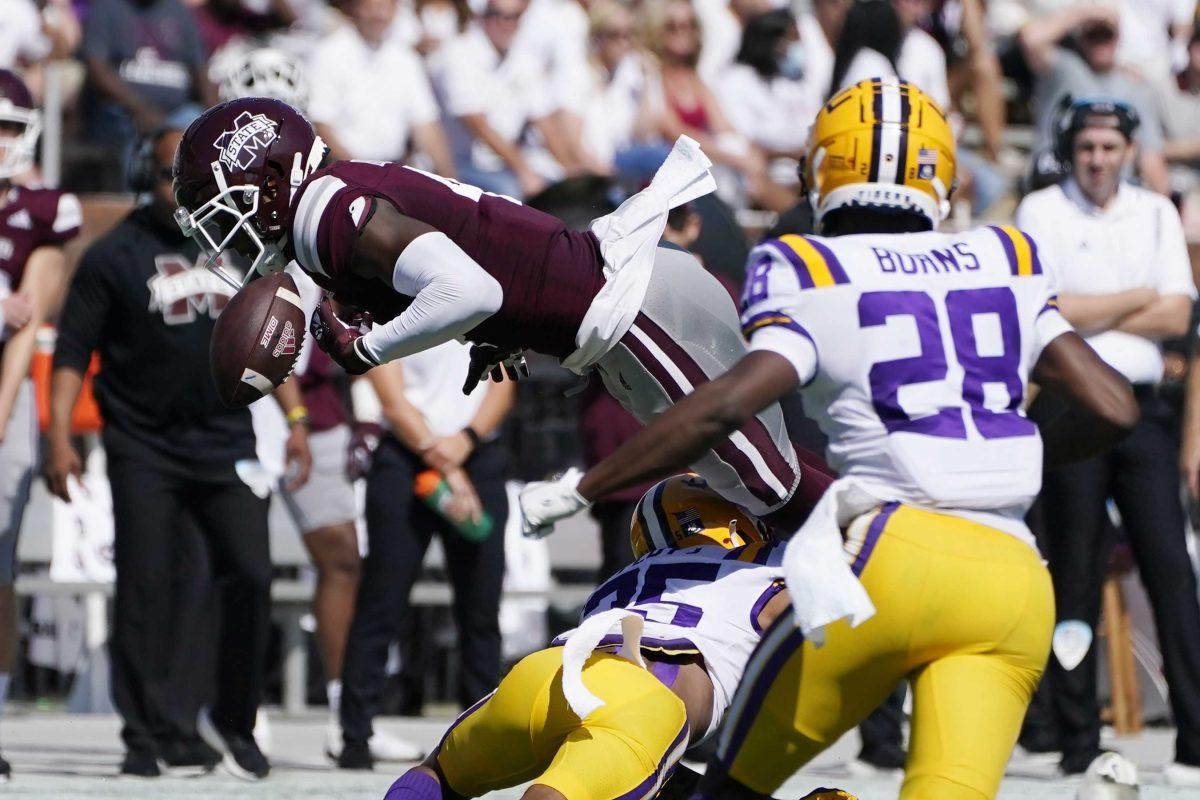On Saturday, Sept. 26, 2020, Mississippi State stormed into Death Valley, embarrassed the reigning national champions and left. On Sunday, Ed Orgeron sat down, watched the film and tried to figure out what went wrong.
That’s when, Orgeron said, he got an idea. What if his defense drew up something crazy, a scheme that would shock the Bulldogs, a plan that would defy the football philosophy he held dear?
In the rematch against Mississippi State, Orgeron’s defense rushed only three linemen. They added a third safety, who joined three corners and two linebackers in the most frequently used formation. It worked. LSU’s defense turned in its best performance of the season — they controlled the whole game and largely kept the Bulldogs’ Air Raid offense in check. The Tigers held off a late rally and won 28-25.
“I don’t think they expected us to be in a three-man front,” Orgeron said after the win.”
In 2020, Mississippi State threw for an SEC-record 623 yards. They scored 44 points, with a number of long touchdowns from deep routes and crossing patterns. A year later, after Orgeron decided to adjust and his defense grew up a little, LSU allowed 486 total yards and 25 points. They forced two turnovers, a fumble on the first series and an interception a couple of drives later, both by nickel corner Cordale Flott.
The Tigers’ new and improved, backloaded defense was designed not to let Bulldogs get behind them like they did so many times in 2020. They kept the box light, practically begging Mississippi State to run the ball. Head Coach Mike Leach refused, and his quarterback threw 62 passes.
“We didn’t worry about the short throws,” Orgeron said. “It was the deep balls and the crossing routes that hurt us last year.”
The Tigers’ soft defense, indeed, allowed short gains. On one drive in the third quarter, the Bulldogs gained 60 yards on 14 plays, but the promising drive ended with a missed field goal from the 15-yard line. At the time of the miss, Mississippi State possessed the ball for nine more minutes than LSU. They had managed to score only three points. Orgeron’s defense would not get torched again. Not this time.
Jay Ward, who drew the ire of fans for mistakes he made in the 2020 game, started at safety, holding the Tigers’ last line of defense. It largely held tight.
“Last year I struggled,” Ward said. “This year, I’m healthy. I came back strong.”
Damone Clark, who struggled to cover receivers and backs in space in 2020, and had trouble tackling ball carriers, played a much better game on Saturday. His defense’s tackling was noticeably improved from a year ago, and the unit played with more bite and lots of swagger.
“I’m just proud of how our defense fought,” Clark said.
If the defensive game plan was Orgeron’s, like he said, then the win belongs to him too. It was an important game for the suddenly embattled coach. Since LSU’s embarrassing loss to UCLA, he’s been forced to hear louder calls for his firing. Another loss to open up SEC play would spell doom. A win quiets the critics. For now.
The story of Orgeron’s unique coaching journey can be told in his differing leadership styles. Would he choose a hands-on or hands-off approach?
At Ole Miss, it’s no secret that Orgeron failed because he meddled too much. In 2019, it was obvious his team succeeded because he hired the right people, got out of their way and let them do their jobs. Joe Brady revolutionized the Tigers’ offense, and Dave Aranda had full rein over the defense, despite his philosophical disagreements with Orgeron. But in 2020, Orgeron didn’t do enough. He lazily hired his new defensive coordinator, he later admitted, which led to the disastrous Bo Pelini era, which began against Mississippi State.
If Orgeron swings and misses on his second hire for defensive coordinator, he may not get a third strike. Daronte Jones, his eventual choice, oversaw a defense that opened the season by getting routed by UCLA. He had a couple non-conference games and three weeks to prepare for an SEC slate. So on the Monday before the Mississippi State game, he relayed to his unit the plan: they would rush three and drop eight back in coverage. Orgeron gave him credit for preparing the team and properly installing the scheme.
“When you lead the nation in sacks,” he said, “it’s hard to go with a three-man rush.”
It must have pained Orgeron, noted connoisseur of the pass rush, to give the Bulldogs’ quarterback a clean pocket all day. But it worked. And he’ll wake up on Sunday with better film to watch. He’ll see a glimmer of hope to save his team’s season and, perhaps, his job too. Auburn awaits.
“We’ve been working on stopping this Air Raid since last year,” Orgeron said. “We made some improvement, but wish we would have finished.”




